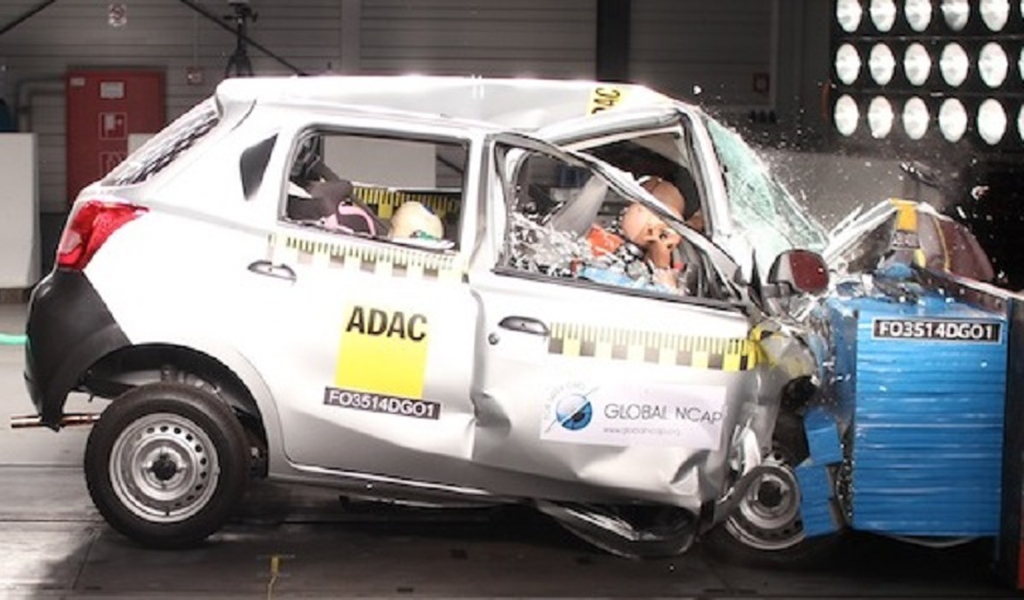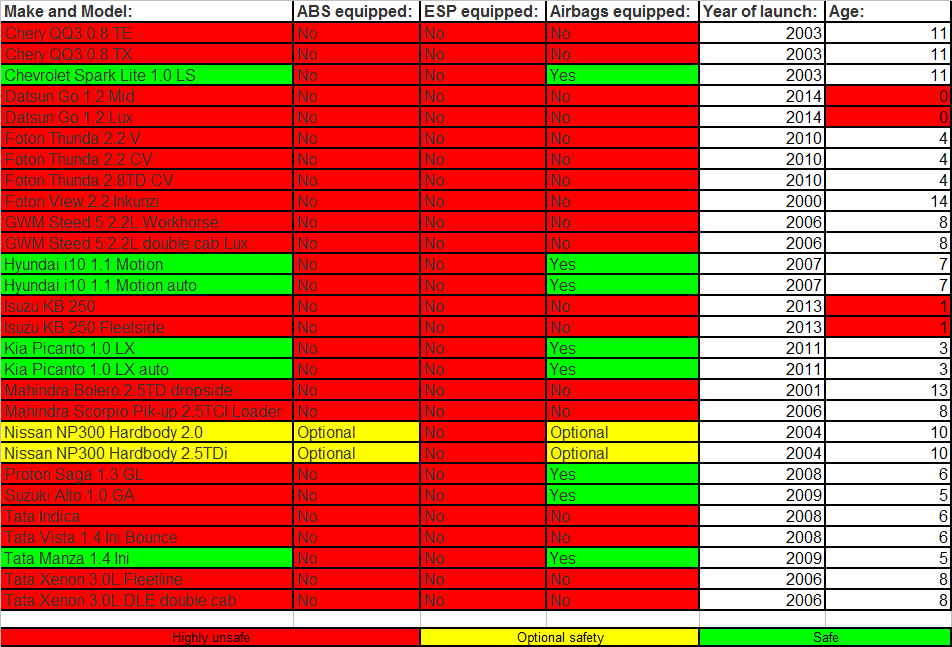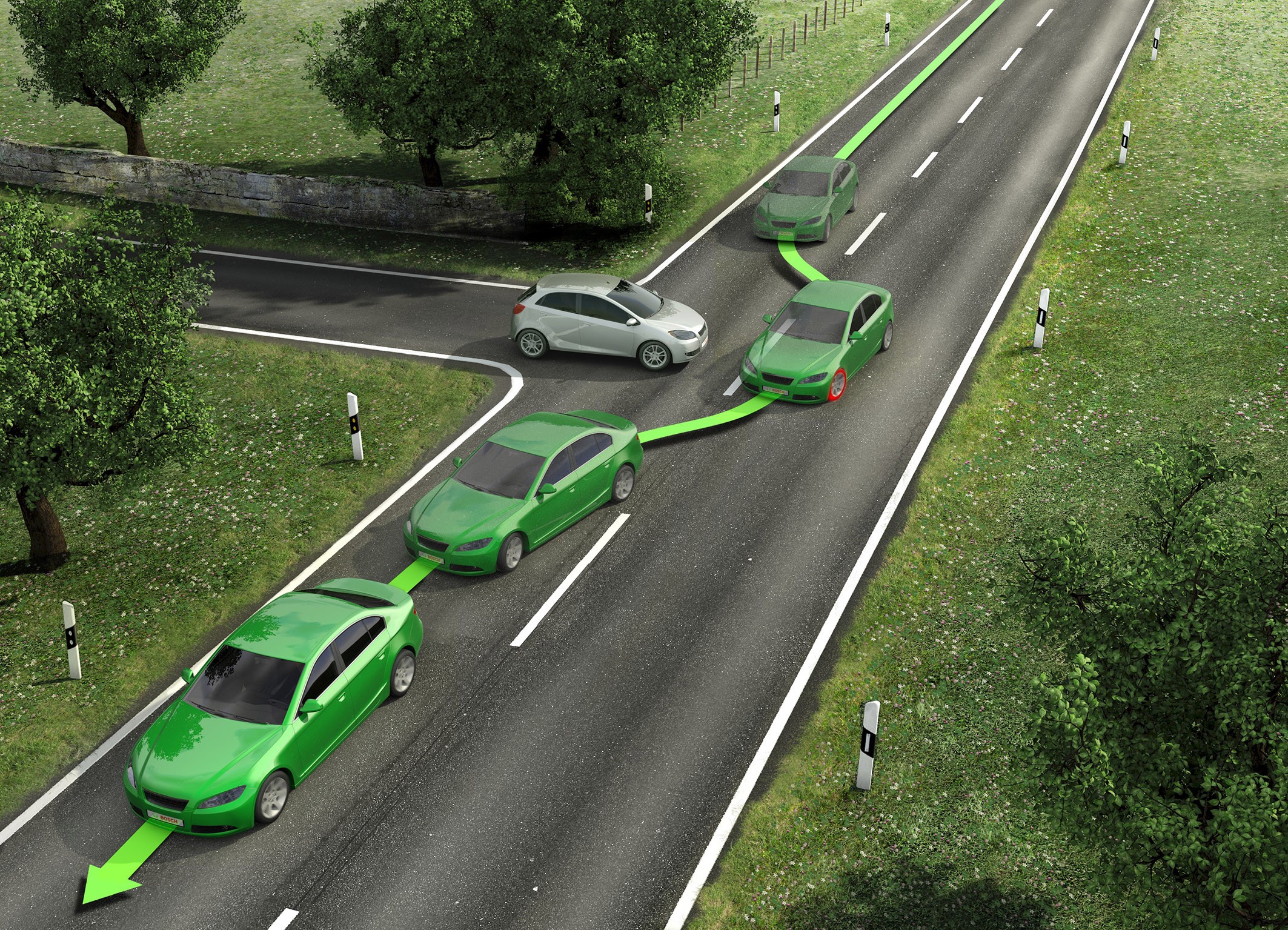
It’s 2014, and we’ve come a long, long way from the dark ages of motoring where manufacturers didn’t have safety technology available to them. We now live in a world with technology such as ABS, EBD, EBA, airbags, clever ESP systems and a whole lot more. Why then do we still have cars being released that don’t have any safety systems whatsoever?
It’s something rarely touched on, the level of safety equipment in vehicles on sale in South Africa, but the recent launch of the Datsun GO has drawn much attention to the matter. The GO has been launched at the price of R89 500 for the entry level model, and as impressive at it is, neither that, nor the top-spec model are equipped with ABS brakes or airbags, and neither of these safety measures is available as even an optional extra.
Despite this, there has been much discussion and much support for the GO, with people claiming that an affordable entry point to the new car market is an incredible idea and one that should be praised above all else. However, I for one can not see the value of an entry level car in 2014 that doesn’t provide safety for the ‘new’ driver that this car is targeting. Sure, it’s cheap, but that cheap price tag comes at the price of basic safety equipment. Even vehicles such as Chevrolet’s Spark Lite come with airbags as standard, and for only a whisker more than the magical R100 000 mark.

The Datsun GO isn’t the only vehicle on the South African market without safety features though – there are no less than 28 passenger vehicles and single-cab pickups that don’t feature ABS, of which only 2 offer it as an optional extra. However when you take this list and cross off vehicles at least equipped with airbags the number of ‘unsafe’ vehicles drops to 18. That’s 18 vehicles without any safety kit whatsoever!
Obviously in the past we made do without this safety equipment, but with each coming year the number of vehicles on the road is increasing and the number of dangers is growing higher. Cell phone technology now distracts people more than ever, and poor road conditions only compound the dangers we face every day.
Of all the 18 vehicles on the aforementioned list without any safety equipment, 14 of these are all 4 years or older, meaning that they’ll either be liable for a facelift or discontinuation sometime in the near future, at which point the facelifted models could stand to receive at least an airbag or two. However, 4 models have been released within the past 2 years that feature no safety equipment or option to include it – the Isuzu KB250 in its lowest spec, and the Datsun GO in all available spec levels. (Note: The Isuzus still score a 4-star NCAP safety rating)
Some people don’t seem to see the issue with this, as an affordable car is their foremost thought – but when we consider that the average age of cars on South African roads is 11 years old, we need to have some foresight and look 11 years from now. In 11 years, will we live in a world where it’s acceptable, and safe, for a vehicle to not have either ABS or airbags? I don’t think so; in fact by 2025 safety shouldn’t even have to be a worry should you be involved in an accident.
But still, there are those that advocate for the GO’s affordability factor extenuating its lack of safety, citing that ABS isn’t necessary, and airbags can be done without for inner-city driving. But just the mere inclusion of airbags can drastically improve a vehicle’s safety.
An excerpt from a recent Global NCAP article states that “In January 2014, Global NCAP published crash test results for five of India’s best-known cars: the Suzuki Maruti Alto 800, the Hyundai i10, the Ford Figo, the Volkswagen Polo, and the Tata Nano. All the cars received zero-star adult protection ratings. Volkswagen has since decided to offer the Polo for sale in India with two airbags as standard. This model subsequently received a four-star safety rating.”
However even if we were to accept the premise that a vehicle can do without airbags, there would be several other factors at play. A vehicle’s structure would need to be rigid enough to hold its shape and protect its occupants, and it would also require sufficient crumple zones to reduce the force inflicted on its inhabitants.
The Datsun GO unfortunately fails in these departments too. A recent Global NCAP crash test of the Datsun GO and Maruti Suzuki Swift found both of these vehicles to be unsuitable for even a 1 star NCAP rating. Furthermore, the GO’s vehicle structure collapsed under test conditions (a crash at 64km/h – the speed where most fatalities occur), meaning that even the fitment of an airbag would not be able to adequately shield the inhabitants from injury. If the GO will crumple this badly at 64km/h, I can’t even imagine the carnage at 120km/h, the legal highway speed limit in South Africa.
The Maruti Suzuki Swift, available in South Africa as the Suzuki Swift 1.2, also received a score of 0; however Global NCAP stated that as it retained its structural rigidity, the fitment of airbags would improve occupant protection. Important to note is the fact that the Swift 1.2 is sold in South Africa with airbags, ABS, and ESP as standard equipment.
For the full Global NCAP article on the tests of these 2 cars, as well as test results and videos of the tests, click HERE.
Please don’t think I’m merely picking on the Datsun GO; Isuzu offering two KB250 variants without airbags or ABS is also highly irresponsible, but the GO is far more likely to result in serious injury or death, as it is so much cheaper and caters to a target market of ‘entry level shoppers’ as opposed to the Isuzu’s utility-orientated target market. The GO is also the only vehicle not to offer these basic safety features on any model across the range, and it is still due to continue in the market for at least another 6 years.
So what’s the point of all this? Well, when is safety finally going to become our first priority? At what point do we realise that the need to be safe is far greater than the need to own the cheapest car available? As of November 1st, all newly registered vehicles in Europe are required to have ESP systems installed, and in New Zealand ESC is legally required on all models imported to the country, yet in South Africa we have newly released vehicles without a single airbag – even the Citi Golf in its last iterations featured a single driver airbag, and that was discontinued due to safety concerns.

Safety should be of utmost importance to us all. Whether we’re shopping for our own first car or for our children’s first car, surely our very 1st thought should be the safety of us, our loved ones and those around us? In 2014, with so much available safety technology, a new vehicle without any safety technology is simply unacceptable. The notion that it is OK merely because it is cheap is naïve and should be quelled before it takes root in society. If we don’t make safety a standard now, when the technology is so freely available, then when will we draw the line and make it compulsory?








